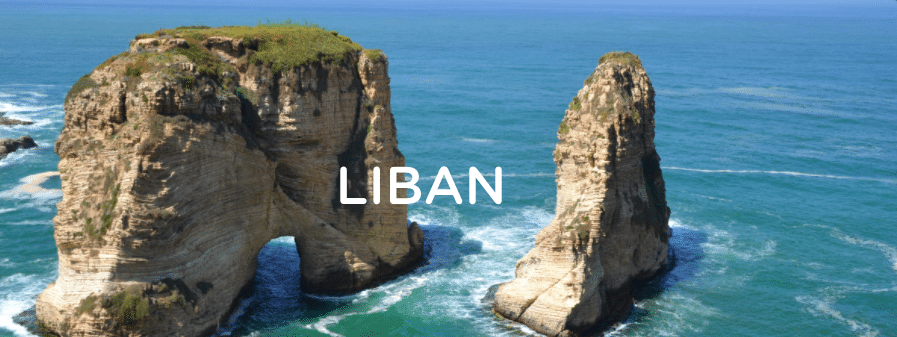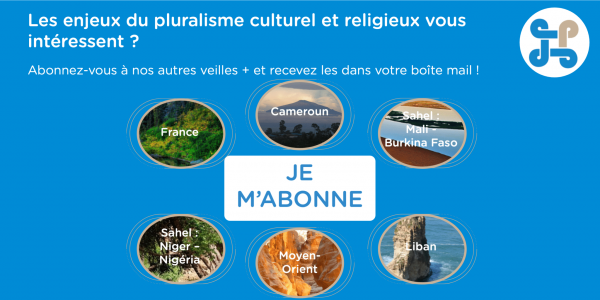|
| |
L’année 2022 se termine dans un Liban toujours en proie à une grave crise économique et où les tentatives d’émigration augmentent. L’État libanais souhaite un retour progressif des réfugiés syriens. Les tensions entre ces derniers et la population libanaise s’accentuent. Le Secrétaire général du Hezbollah a appelé à l’élection d’un nouveau président de la République sans attendre l’intervention d’une puissance étrangère.
The year 2022 is ending in a Lebanon still in the grip of a serious economic crisis and where emigration attempts have drastically increased over the past year. While the Lebanese state still wants a gradual return of Syrian refugees, tensions between the latter and the Lebanese population seem to be increasing against the backdrop of a prolonged worsening of the country's economic situation. Finally, in his speech, the Secretary General of Hezbollah called for the election of a new President of the Republic without waiting for the intervention of a foreign power.
|
|
|
|
| |
Info phare - Source médiatique |
|
|
|
| |
Des Libanais prennent la mer pour fuir leur pays
3 000 personnes auraient pris la mer en 2022. Si la part des réfugiés syriens reste majoritaire, celle des Libanais ne cesse d’augmenter et représente aujourd’hui près d’un quart des départs. Ces Libanais viennent plus particulièrement de Tripoli et du nord du pays, où la crise économique est la plus forte. C’est au péril de leur vie et après avoir vendu l’ensemble de leurs biens pour payer la traversée que des Libanais espèrent rejoindre la Grèce ou Chypre, malgré les risques d’arrestation par les garde-côtes européens et les cas de maltraitances par les autorités grecques et turques.
|
|
Departures to Europe intensify
It is estimated that 3,000 people took to the sea in 2022. Although Syrian refugees remain in the majority, the number of Lebanese refugees is constantly increasing and now represents nearly a quarter of departures. These Lebanese come from all Lebanese regions but more particularly from Tripoli and the north of the country, a region particularly affected by the economic and social crisis that the country has been going through for more than three years. It is therefore at the risk of their lives and after having sold all their belongings to pay for the crossing that Lebanese hope to reach Greece or the island of Cyprus. Despite the risks of arrest by the European coastguards or those linked to cases of mistreatment at the hands of the Greek and Turkish authorities, the Lebanese feel that in the face of national chaos, exile has become their only horizon.
|
|
|
|
|
|
| |
La tension monte entre les réfugiés syriens et les citoyens libanais
L’État prône un retour progressif des 1,5 million de réfugiés syriens présents au Liban. Les réfugiés syriens affirment que les relations avec la population libanaise se détériorent jour après jour. Le sujet majeur est l’accès aux aides sociales octroyées par l’ONU. Certains Libanais jugent que les familles libanaises sont désavantagées vis-à-vis des réfugiés syriens. Cependant, l’ONU affirme que plusieurs dizaines de milliers de familles libanaises bénéficient de l’aide internationale.
|
|
Tension rises between Syrian refugees and Lebanese citizens
While the Lebanese State advocates a gradual return of the 1.5 million Syrian refugees present in Lebanon, arguing that the country is no longer able to accommodate them, friction is increasing between the Lebanese population and the Syrian refugees. Syrian refugees claim that relations with the Lebanese population are deteriorating day by day, with the main issue being access to social aid offered by the UN. Some Lebanese consider that Lebanese families are at a disadvantage vis-à-vis Syrian refugees in terms of international social aid. Despite the UN's denial that tens of thousands of Lebanese families have benefited from international aid, the increase in the poverty rate seems to make the increase in friction inexorable.
|
|
|
|
|
|
| |
Le leader du Hezbollah appelle à l’élection rapide d’un président de la République
Le secrétaire général du Hezbollah a appelé les politiciens libanais à ne pas attendre l’intervention d’un pays étranger ou des développements en matière diplomatique pour l’élection d’un nouveau président de la République. Le chef du Hezbollah a salué la tenue de plusieurs réunions bilatérales alors que la tentative d’un dialogue national a été rejetée par plusieurs partis libanais à la mi-décembre. Concernant les critères du président souhaité par le Hezbollah, son chef a affirmé que le parti ne souhaitait pas nécessairement d’un président qui protège la formation, mais d’un président qui ne la poignarderait pas dans le dos. Abordant les rumeurs de tensions entre le parti de Dieu et le Courant Patriotique Libre - suite à plusieurs critiques publiques formulées par le parti de l’ex-Président Michel Aoun à l’encontre de la formation chiite - le secrétaire général du Hezbollah a affirmé, que plusieurs réunions se tiendraient dans les prochains jours et que le Hezbollah se refusait à une critique publique de ses alliés. Enfin, commentant la formation d’un nouveau gouvernement israélien et le retour de Benjamin Netanyahu, le secrétaire général du Hezbollah a affirmé que son parti ne craignait en aucun cas ce nouveau gouvernement et que toute modification des règles de dissuasion et d’engagement avec le Liban ne serait pas permise.
|
|
Hezbollah leader calls for quick election of a President of the Republic
In a speech on Tuesday, the secretary general called on Lebanese politicians not to wait for foreign intervention or diplomatic developments to elect a new president of the Republic. Despite this criticism, the Hezbollah leader welcomed the holding of several bilateral meetings while the attempt to hold a national dialogue had been rejected by several Lebanese parties in mid-December. Regarding the criteria for the president Hezbollah wanted, its leader said that Hezbollah did not want a president who would protect the formation but a president who would not stab it in the back. Addressing the issue of the relationship between the Party of God and the Free Patriotic Movement and the rumors of tension between the two formations following several public criticisms made by the party of former President Michel Aoun against the Shiite formation, the Secretary General of Hezbollah said that several meetings would be held in the coming days and that Hezbollah refused to publicly criticize its allies. Finally, commenting on the formation of a new Israeli government and the return of Benjamin Netanyahu, Hezbollah's Secretary General said that his party was in no way afraid of this new government and that any change in the rules of deterrence and engagement with Lebanon would not be allowed.
|
|
|
|
|
|
| |
Sayyed Ali Fadlallah appelle à la fin des discours provocateurs
Dans son sermon du vendredi, le dignitaire chiite Sayyed Ali Fadlallah a appelé les formations politiques à s’éloigner des discours qui pouvaient provoquer des tensions intracommunautaires ou politiques. Le dignitaire chiite a affirmé qu’en refusant de trouver un consensus national transcendant les intérêts partisans et personnels, les formations politiques du pays avaient trahi l’espoir et la confiance du peuple libanais. Le dignitaire chiite a indiqué que le maintien de cette situation de blocage politique pouvait mener à une dislocation de l’État libanais.
|
|
Sayyed Ali Fadlallah calls for an end to provocative speech
In his Friday sermon, Shiite cleric Sayyed Ali Fadlallah called on the political formations to move away from speeches that could provoke intra-communal or political tensions. Furthermore, the Shiite leader said that by refusing to find a national consensus that transcends partisan and personal interests, the country's political formations had betrayed the hope and trust of the Lebanese people. The Shiite dignitary finally indicated that the continuation of this situation of political deadlock could lead to the dislocation of the Lebanese state.
دعا السيد علي فضل الله ، في خطبة الجمعة الى «الابتعاد عن كل خطاب يؤدي إلى استفزاز المشاعر الطائفية والمذهبية والسياسية، أو يحمل إيحاءات تؤدي إليه» وأضاف السيد علي فضل الله «كنا نأمل ممن تحملوا المسؤولية في هذا البلد وأمانة الناس فيه أن لا ينطوي هذا العام إلا قد قاموا بمسؤوليتهم لرفع هذه المعاناة، وذلك بتحريك عجلة الدولة والذي تكون البداية فيه بانتخاب رئيس للجمهورية أمين على هذا البلد، وصولا إلى حكومة فاعلة قادرة على النهوض بأعبائه، لكن خاب ظن اللبنانيين حين لم يبد أي من هؤلاء أي استعداد لتجاوز أوهامهم أو حساباتهم الخاصة ومصالحهم الفئوية لإيجاد صيغة توافق لتأمين هذا الاستحقاق، ما يبقي الدولة في حال المراوحة القاتلة والتي قد تتحول إلى دويلات إن بقي كل على مواقفه،(…)».
|
|
|
|
|
|
| |
Le patriarche Raï renouvelle son appel à une conférence internationale
Dans son homélie dominicale, le patriarche maronite Raï a critiqué le Hezbollah sans le nommer en affirmant que des forces politiques empêchent l’État de se doter d’un président de la République au nom d’arrière-pensées personnelles, confessionnelles et étrangères. Le patriarche maronite a indiqué que « quelqu’un » souhaitait l’élection d’un président appartenant à son projet politique, projet qui serait en opposition avec le projet historique du Liban. Enfin, Mgr Raï a réitéré son appel à la tenue d’une conférence internationale sur le Liban, sous l’égide des Nations unies. Cette conférence viserait à assurer la neutralité du Liban face à tout conflit militaire et à assurer une stabilité du pays dans une période d’instabilité au Moyen-Orient.
|
|
Patriarch Rai renews call for international conference
In his Sunday homily, the Maronite Patriarch Rai once again criticised Hezbollah without naming it, saying that political forces are preventing the state from having a president of the Republic for personal, confessional and foreign reasons. The Maronite Patriarch also said that "someone" wanted the election of a president belonging to his political project, a project that would be in opposition to the historical project of Lebanon. Finally, Archbishop Raï reiterated his call for an international conference on Lebanon, under the auspices of the United Nations. This conference would aim to ensure Lebanon's neutrality in the face of any military conflict and to ensure the country's stability in a period of instability in the Middle East.
|
|
|
|
|
|
| |
This newsletter is written by Pharos Observatory, an observatory of cultural and religious pluralism, as part of its assessment study of religious pluralism in the Near and Middle East. It gathers information, analyses and speeches which may not reflect Pharos Observatory's feeling about the situation, but which should be taken into account as part of the analysis. All recipients, who are Pharos Observatory partners, are encouraged to contribute to this Watch by sharing any information that is worthwhile and fit to print. Ce bulletin de veille est réalisé par l’Observatoire Pharos, observatoire du pluralisme des cultures et des religions, dans le cadre de sa mission d’étude de la situation du pluralisme au Proche et au Moyen-Orient. Il rassemble des informations, analyses et déclarations qui ne reflètent pas systématiquement la perception de la situation par l’Observatoire Pharos, mais qui constituent des documents à intégrer dans l’analyse. Les destinataires, partenaires de l’Observatoire Pharos, sont invités à contribuer à la qualité de cette veille par le partage de toutes informations utiles et diffusables.
|
|
|
|




